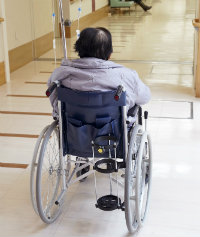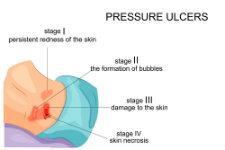What are bedsores?
Bedsores, also known as pressure sores, pressure ulcers, or decubitus ulcers, are open wounds on the skin. They typically develop on the skin covering bony areas such as the tailbone, hips, back, ankles, heels, elbows, and buttocks. These sores result from prolonged pressure on one area of the body, causing a lack of blood flow to that area. Bedsores are one of the most dangerous forms of nursing home neglect, often due to negligent care at nursing homes and other assisted living facilities.
Has your loved one developed bedsores in a care facility? Let’s talk.
Case Results
$185,000 Settlement for an elderly woman who suffered from untreated bedsores and wounds, leading to the amputation of her leg.

Nursing Home residents who spend long periods in a wheelchair
Nursing Home Residents at Risk
According to the Centers for Disease Control and Prevention (CDC), 2% to 28% of nursing home residents suffer from bedsores.
Bedsores are common among:
- The elderly and disabled
- Those who spend long periods in bed or in a wheelchair
- Individuals unable to move certain body parts without assistance
Bedsores are preventable with proper care by facility staff. However, if left untreated, these sores can lead to infections, hospitalization, and other life-threatening conditions.
Need Additional Information about Nursing Home Abuse & Neglect?
- Find blog articles related to Nursing Home Abuse & Neglect
- Signs of Abuse & Neglect
- Nursing Home Bedsores
Contact us at (877) 284-6600 for a free, no-obligation case evaluation.
Nursing home neglect resulting in bedsores
Many families rely on the staff at nursing homes and other assisted care facilities to provide proper care to an elderly or disabled family member. Unfortunately, in some nursing homes, residents are neglected. When the staff fails to properly turn or re-position a resident, bedsores develop, leading to severe and even life-threatening conditions.
Neglectful Treatment Contributing to Bedsores

Illustration of four stages of bedsores
Neglectful treatment in nursing homes that can contribute to the development of bedsores includes:
- Allowing immobile residents to remain in the same position for extended periods
- Allowing moisture to stay close to the skin (e.g., not changing soiled adult diapers or wet bed sheets)
- Failing to regularly check residents for signs of bedsores and not notifying family or a physician if bedsores are found
Additionally, residents may suffer from dehydration or malnutrition when they are not being turned or re-positioned.
Contact us at (877) 284-6600 for a free, no-obligation case evaluation.
Nursing Home Bedsore Lawsuits
Bedsores, pressure sores, pressure ulcers, and decubitus ulcers can be extremely painful and sometimes even deadly. Most bedsores are avoidable with the proper care and treatment. The failure of the nursing home or assisted care facility to provide the proper standard of medical care increases the risk of developing bedsores.
Remember, developing bedsores is never the fault of your loved one. Negligence by nursing home staff is never acceptable. The cost of treating bedsores can be expensive. A bedsore lawsuit can compensate you and your loved one for the injuries suffered.
In the Kansas City area, the attorneys at Nash & Franciskato are experienced in recovering financial compensation for medical expenses, pain and suffering, disfigurement, and emotional trauma. We are your advocates and the voice for your elderly family members, fighting to stop their pain and suffering. We bring:
- Over 80 years of combined experience
- Trusted legal advisor committed to your needs
- Free, no-obligation review of your case
- Super Lawyers for over 10 years
- The AV Preeminence Rating for Ethical Standards & Legal Ability
- Compassionate advocacy for you and your family
Receive a Free Evaluation from a Nursing Home Bedsore Attorney
The attorneys at Nash & Franciskato have extensive experience handling nursing home bedsore lawsuits. We will review the circumstances of your loved one’s treatment and provide guidance on your legal options. Help protect their rights. Contact us at (877) 284-6600 for a free, no-obligation review of your case.
Contact Us for a free review of your case
Sign up for our Email
If you would like to receive news and blog updates regularly, sign up to receive our email newsletter. Your email address will only be used to send you our newsletter and respond to inquiries.
Editor’s Note: This post was originally published on December 22, 2015. It was reviewed on February 11, 2025, and updated for content and accuracy, and was rep.blished
